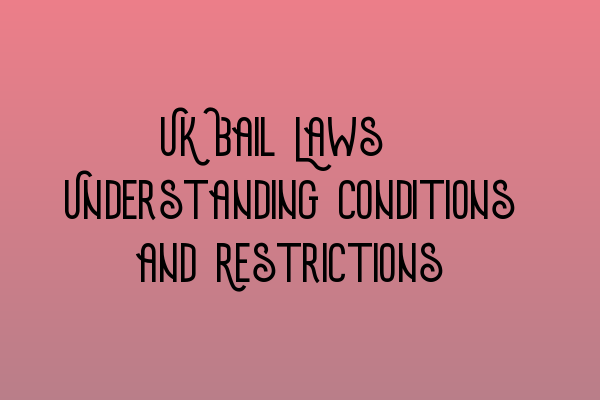UK Bail Laws: Understanding Conditions and Restrictions
When it comes to criminal cases in the UK, bail is an essential aspect that plays a crucial role in the legal process. Understanding the conditions and restrictions of bail is essential for both the accused and the legal professionals involved in the case. In this article, we will delve into the complexities of UK bail laws, exploring the different conditions and restrictions that may be imposed.
Before diving into the details, it’s important to note that bail laws in the UK are designed to strike a balance between the rights of the accused and the need to protect society. The purpose of bail is to secure the accused’s appearance in court while minimizing the risks of further offenses or interference with the justice process.
Types of Bail Conditions
When a person is granted bail, the court may impose certain conditions or restrictions to ensure compliance and the smooth progress of the legal proceedings. These conditions vary depending on the nature of the offense and the specific circumstances of the case. Here are some common types of bail conditions:
- Residence condition: This condition requires the accused to reside at a specific address during the period of bail. It helps ensure that the accused can be easily located if necessary.
- Reporting condition: Under this condition, the accused is required to regularly report to a designated police station or other specified location. This helps monitor the individual’s movements and ensures their compliance with bail conditions.
- Curfew condition: A curfew condition restricts the accused from leaving their residence during specific hours, typically overnight. This helps control the accused’s movements and reduces the risk of their involvement in criminal activities.
- Non-contact condition: This condition prohibits the accused from contacting certain individuals, such as the alleged victim or witnesses, to prevent intimidation or interference with the case.
- Travel restriction: In cases where there is a risk of flight, the court may impose travel restrictions on the accused, which may include surrendering their passport or obtaining permission before traveling outside a specified area.
Restrictions on Bail
While bail is often granted in criminal cases, there are circumstances where the court may refuse bail or impose additional restrictions. Here are a few situations where restrictions on bail may be imposed:
- Flight risk: If the court believes that there is a significant risk of the accused fleeing the country to avoid prosecution, it may refuse bail or impose strict travel restrictions.
- Danger to the public: If the accused poses a threat to public safety or there is a risk of them committing further offenses, the court may refuse bail or impose conditions to protect the public.
- Interference with witnesses: If there is a concern that the accused may interfere with witnesses or the collection of evidence, the court may impose conditions to prevent contact or restrict the accused’s movements.
- Prior criminal record: A history of prior offenses may influence the court’s decision to impose stricter conditions or deny bail altogether.
It’s worth noting that bail conditions can be reviewed and varied throughout the legal process. The court may modify or add conditions if necessary, based on the evolving circumstances of the case.
Conclusion
Understanding UK bail laws, the different conditions, and restrictions that can be imposed is crucial for everyone involved in the criminal justice system. Whether you are an accused individual, legal professional, or simply interested in the intricacies of the law, knowledge of bail laws ensures a fair and efficient legal process.
If you are interested in expanding your expertise in criminal practice, consider attending our Workshops and Seminars on Criminal Practice: Expanding Your Expertise to stay up-to-date with the latest developments in UK criminal laws. Additionally, our article on Updates in UK Criminal Laws: Staying Informed and Prepared provides valuable insights into the changes and updates in the field.
To enhance your SQE criminal law study group experience, check out our article on Enhancing Your SQE Criminal Law Study Group Experience for useful tips and strategies. For a detailed analysis of criminal evidence rules, don’t miss our article on Decoding Criminal Evidence Rules: A Detailed Analysis.
Finally, if you are interested in the rights of victims in criminal procedures and the legal protections and support available to them, our article on Ensuring Rights of Victims in Criminal Procedures: Legal Protections and Support is a must-read.
Stay informed, stay prepared, and stay updated with SQE Criminal Law & Practice Law UK.
